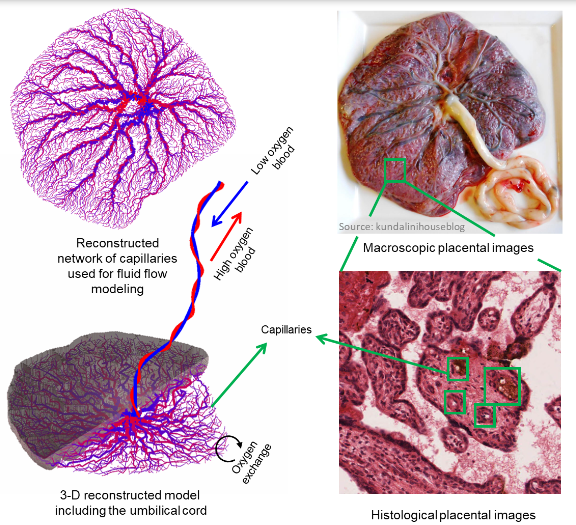Multi-scale image-based modelling of feto-placental hemodynamics
- Academic lead
- Dr Arash Rabbani, School of Computing, a.rabbani@leeds.ac.uk
- Co-supervisor(s)
- Dr Lara Morley, School of Medicine, l.c.morley@leeds.ac.uk, Prof David Beech (MD), School of Medicine, D.J.Beech@leeds.ac.uk, Mr Nigel Simpson, School of Medicine and Consultant Obstetrician and Gynaecologist at the Leeds Teaching Hospital, n.a.b.simpson@leeds.ac.uk
- Project themes
- Biomedical Flows
The placenta is the interface between mother and fetus and undergoes vascular changes and differentiation to maintain effective blood flow circulation to ensure a healthy pregnancy. Impaired placental blood flow can result in fetal growth restriction (FGR), where the baby does not meet its growth potential, and this can have short and long-lasting clinical impacts or even lead to stillbirth which is showing an increase in the UK since 2019. Understanding the blood flow through the vascular network of the placenta is therefore important for the prediction and management of FGR. The aim of this project is to produce an image-based computational tool that predicts blood flow characteristics in the fetoplacental capillaries. This project will combine the analysis of macroscopic placental images with histopathology photomicrographs to reconstruct the fetoplacental capillary network and simulate blood flow using two-element Windkessel model which takes into the account vessels flow resistance and compliance simultaneously. The outcome of this project is to give a better understanding of fluid shear stress in placental vessels which is fundamental in treating the fetal growth restriction. This research will contribute to reducing or controlling pregnancy complications due to impaired blood circulation.

